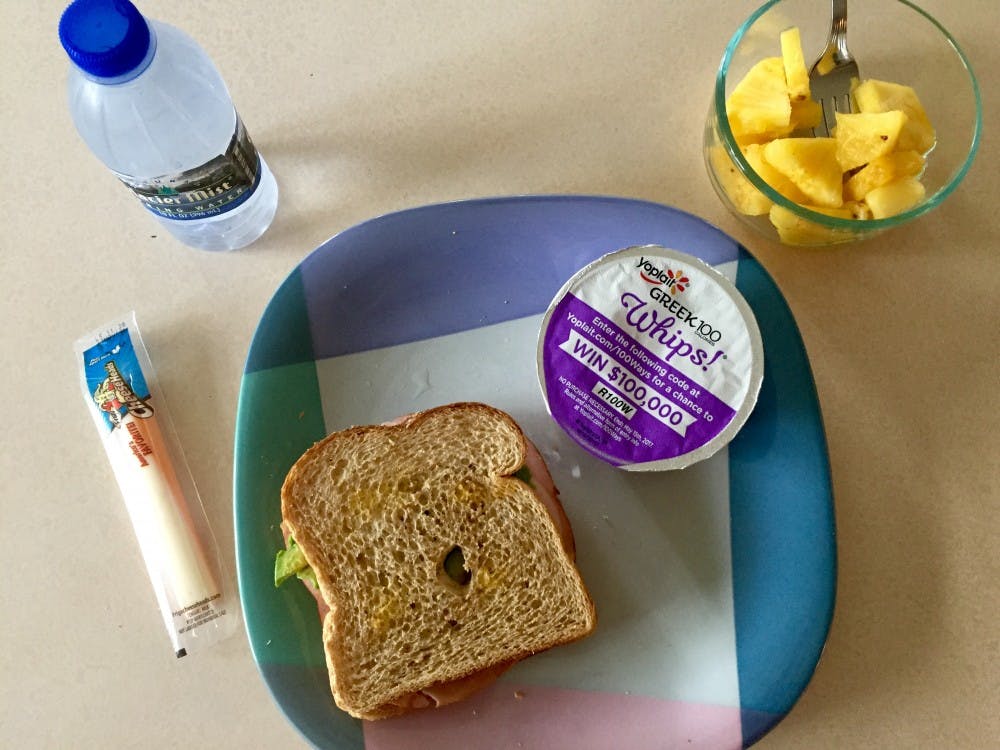With greasy foods and sugary treats available at every dining location, countless pizza shops open until the wee hours of the morning, and those packages of Pop-Tarts and Ramen noodles stowed away in your dorm room, gaining a few pounds during college is not uncommon.
However, the college weight gain is not an inevitable doom; by following these six tips, you can learn to eat healthy and stay fit throughout your college years
1. Look for the healthy options when you enter a dining location.
When you first enter any dining location on campus, you are bound to see the chicken tenders and fries, the extra cheesy pizza, as well as countless other foods that are probably delicious but are also detrimental to your daily calorie count.
However, there are usually quite a few other healthy options available at every dining location that are just as scrumptious. Of course, there are usually the obvious healthy choices, such as salad and grilled chicken, but most students would get tired of eating the same exact meals everyday.
“On campus, customizability plays a very large part in deciding if one food is ‘healthier’ than another,” states Amanda Kruse, Ball State’s wellness nutritionist. “Students might be able to order a pizza with double-meat or a salad piled with bacon & ranch, but in the same line they’d have the option to order pizza with pesto, mushrooms and artichokes, or a salad with chicken, veggies, and vinaigrette. Small food swaps can lower calories and improve nutrient profiles without sacrificing flavor.”
2. Drink more water
Sure, the sugary sodas and sports drinks may look appealing, but water has zero calories and is super great for your body. Plus, let’s remember -- water is free at any dining location on campus. Drinking water helps to boost your metabolism, according to a study by Micheal Boschmann MD and his colleagues at Berlin's Franz-Volhard Clinical Research Center. Water also keeps you hydrated, which helps with clear skin and kidney function.
3. Limit the late-night fast food runs
It’s 2 o’clock in the morning, and your friends decide they want to drive to Taco Bell to get some burritos, tacos, gorditas, and whatever other greasy foods you all are craving.
Sure, it’s okay to do this every once in awhile, but when it becomes a weekly, or even nightly ritual, it will start to add up quickly.
Your body burns calories all the time, but less when you are sleeping. So, make sure you know how to limit yourself. And if you do need that late night snack, try something healthier, like popcorn or a cup of yogurt.
4. Keep healthy snacks on hand.
After class, when you’re doing your daily load of homework, you are probably going to get a craving for a snack.
By stocking up your dorm room with healthy options and limiting the sugary and fatty items, you are way more likely to grab the healthy option when you go to get a snack.
Try to keep foods such as string cheese, protein bars, bananas, or apples (all available at various dining locations around campus) that are easy to grab and snack on right away.
5. Don’t use food as a coping mechanism to stress.
College is bound to come with stresses, with professors who give out hours of homework every night, and the pressure to get involved in student organizations and to balance a social life on top of all that can get students pretty frazzled.
Even though it may seem like eating three bowls of ice cream at The Buff may help your worries to go away, it is most likely just going to make you feel worse.
Oftentimes, people will get into the habit of “emotional eating,” which means eating food for comfort or stress relief instead of eating to actually satisfy hunger.
So next time you are feeling stressed and feel like scarfing down all of those sugary snacks in the dining hall, take a second to step back and think about whether you are actually hungry or not. If you are, then it is perfectly okay to reward yourself with a sweet treat now and then; however, many times when these cravings hit, they are just temporary side effects of the stress you are experiencing.
Exercising can act as a stress reliever, according to Mayo Clinic, it releases endorphins, which are hormones in your brain that improves your mood. So, instead of 'stress eating,' try taking a bike ride or going to the Student Recreation and Wellness Center to get your mind of of your worries and relieve some stress.
6. Become informed
If you are having trouble deciding if something is a healthy option, Ball State has some resources available to its students. Ball State sponsors a website called NetNutrition , that lists the different foods each dining hall around campus is serving each day, as well as the complete nutrition information for every item served.
In addition, Ball State has “Eat Right @ BSU” tip sheets, available to all students. These sheets provide healthy meal ideas to students for various dining locations around campus.
Also, many campus dining locations host monthly sampling events, offering free, nutritional food for students to taste.
Lastly, many students do not realize that if you have a meal plan, you have the option to set up an individual nutritional consultation with Kruse. You can discuss your individual dietary needs, and she can then help by giving advice about what different foods you should select in the dining halls.





